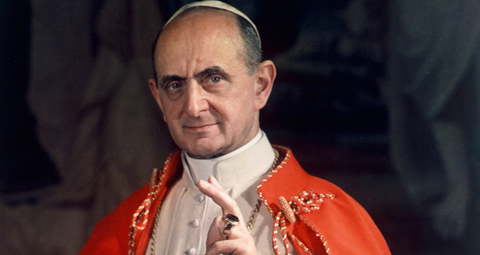BY Amanda Connelly | July 27 | ![]() 0 COMMENTS
0 COMMENTS ![]() print
print

50 years on, some young Catholics are embracing Humanae Vitae as a ‘self-giving act of love’
On the 50th anniversary of Humanae Vitae we look at sex and relationships in the 21st century, and examine why some young Catholics are now embracing the encyclical’s radical message
July 25 marked 50 years since the release of Humanae Vitae, Pope Paul VI’s encyclical on birth control.
Published in 1968, during the sexual revolution, it subsequently sparked intense political debate over its content—namely, its reaffirmation of the Church’s teachings on marital love, responsible parenthood, and artificial contraception.
The criticism of Humanae Vitae’s teachings has persisted within the secular world over the past 50 years, with many branding it as out of touch with the world of today.
Yet according to one married couple, some young people find it both ‘relevant’ and ‘inspiring’—with almost 200 other young UK Catholics agreeing with them, as well as 500 priests from around the country.
Michael and Elisabeth Wee, a young married couple with one child, who live and work in Oxford, wrote an open letter voicing their support for Humanae Vitae. Having initially circulated the letter via email to their Catholic friends in Oxford and at Durham University where the pair met as students, word soon spread far beyond, racking up almost 200 signatures in just four days.
“The teaching of Humanae Vitae is often thought to be out of date, or even ludicrous and laughable,” Mr Wee told the SCO. “For many it is unthinkable that there are real young Catholics who actually accept the Church’s teaching on contraception and who wish to live it out.
“It goes against all expectations of what ‘young people’ are supposed to be like. We wrote this letter to address these misconceptions; we wanted people to know that, in fact, there are those who find Humanae Vitae relevant to their lives, and who see in the Church’s teaching on sexuality an inspiring ideal to pursue.”
He said the couple were ‘hopeful for a big response’ and that their ‘optimism had been vindicated.’
The letter is something Mr Wee said is ‘very encouraging’ for the Church’s future.
“We hear all kinds of voices on the media today about the Church and her teachings, but one perspective we almost never hear is that of young, practising Catholics and what they think about the Church’s teachings,” he said.
“The level of enthusiasm we received regarding this letter indicates that actual, church-going Catholics want their voices to be heard and acknowledged.
“I think this letter, having been signed by so many young Catholics, challenges many of the usual narratives and preconceived notions about ‘young people.’
“It also shows that the teaching of Humanae Vitae is not some lofty vision reserved for a few brave or strong-willed souls. It is within reach of everyone.”
Mr Wee’s comments were sparked by a similar letter signed by 500 priests in Britain, showing support for the encyclical. He said the letters should remind us that ‘whether we are priests or laypeople, we should not be embarrassed to proclaim the teaching of Humanae Vitae as one Church, or be afraid that no one might listen.’
He pointed out that the encyclical is ‘caricatured’ over and over as celibate males trying to control women’s bodies, but he argued that the Church’s teaching on contraception is ‘about offering us a positive and liberating vision of sexuality—one that begins by taking sex seriously, as an act of such great significance that it cannot simply be reduced to a mere recreational activity.’
“Perhaps the fundamental question that Humanae Vitae poses to our society today is, ‘Is sex intrinsically connected to love?’ If our answer is ‘Yes,’ then we can more easily understand how contraception is antithetical to mutual love and respect,” Mr Wee said.
“Contraception alters the sexual act by turning it into something than is less than total self-giving, as if there are conditions imposed on making love.
“While it is true that contraception is used by many couples who love each other, it is impossible to be blind to the possibilities for selfishness and abuse that come with contraceptive use.
“Given the intimacies involved in sexual relationships, is this something we want to risk?
“Contraception is often thought of as a ‘women’s issue.’ But as Catholics we should think of it as a ‘couple’s issue.’
“This is the true revolution that Humanae Vitae holds for our times. It is about how couples can be most loving towards each other, and how self-control is not some external condition imposed on our intimate relationships as a kind of killjoy, but is part of the fabric of mutual love and respect, and helps to safeguard our love and fidelity to our spouses.”
Glasgow University chaplain Fr Ross Campbell was one of the almost 500 priests named on the list of signatories, signing it as he believes the Church’s teaching on love and sex is ‘something that’s often misrepresented.’
“It’s something that is portrayed in a negative sense, particularly in the media, but also even within the Church sometimes, but it is something fundamentally positive and life-giving,” he said.
“It seems like an opportune time to reaffirm that, and I think it’s important for those Catholic families who are living the Church’s teaching to know they have the support of their priests, of the clergy.”
Fr Campbell spoke of how timely the ‘prophetic’ document is, and how Pope Paul VI makes a number of predictions in it ‘which seem to have come true.’
“When he talks about this sort of ‘objectivising’ of sex, when we lose the sense of its sacredness and its importance in creation, we can often end up treating the other as an object, and that has a number of consequences: breakdown of the family, abortion, so on and so forth,” he said.
“I think it shows freedom. Obviously sex is something good and beautiful, but within the right context,” he added. “When we separate sex from love it’s never good. So often then sex can be misused, and I think we’ve seen that—I mean look at all this stuff [sexual abuse allegations] in Hollywood over this last year.”
Fr Campbell also pointed to the young Catholic families in his own parish, and the happiness that following the teachings of the Church gives them.
“Those young people, those young Catholic families, who do live by the teachings of Humanae Vitae and John Paul II’s Evangelium Vitae, what we tend to see is that these families are families filled with Faith and joy,” he explained.
“They become signs in the world; they become Sacraments to the beauty of the Church’s teaching on this.
“I’ve got a number of families like that in my own parish, and that in itself is a magnet; it attracts others to it, because it stands against; it stands as an alternative to the cultural attitude to these things.”
While recognising that it is not always easy to follow the teachings, he added that it ‘gives joy and life to those families.’
“I think those who follow the teaching of the encyclical are really the ambassadors of it,” he continued. “It’s them, not the encyclical itself, that’ll attract others.”











